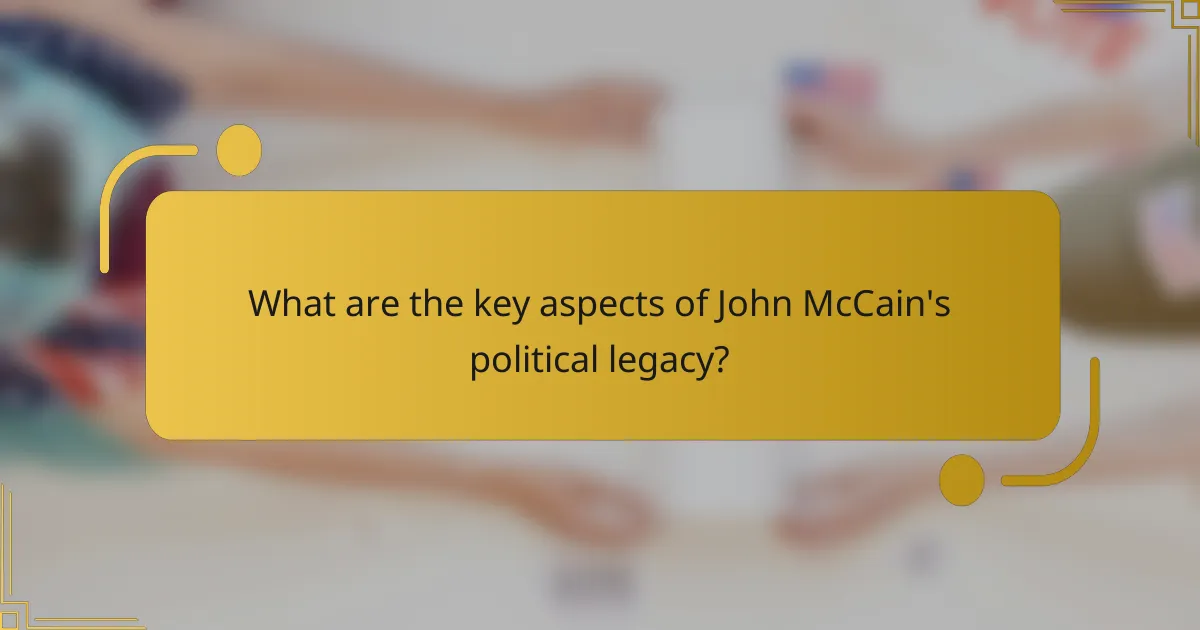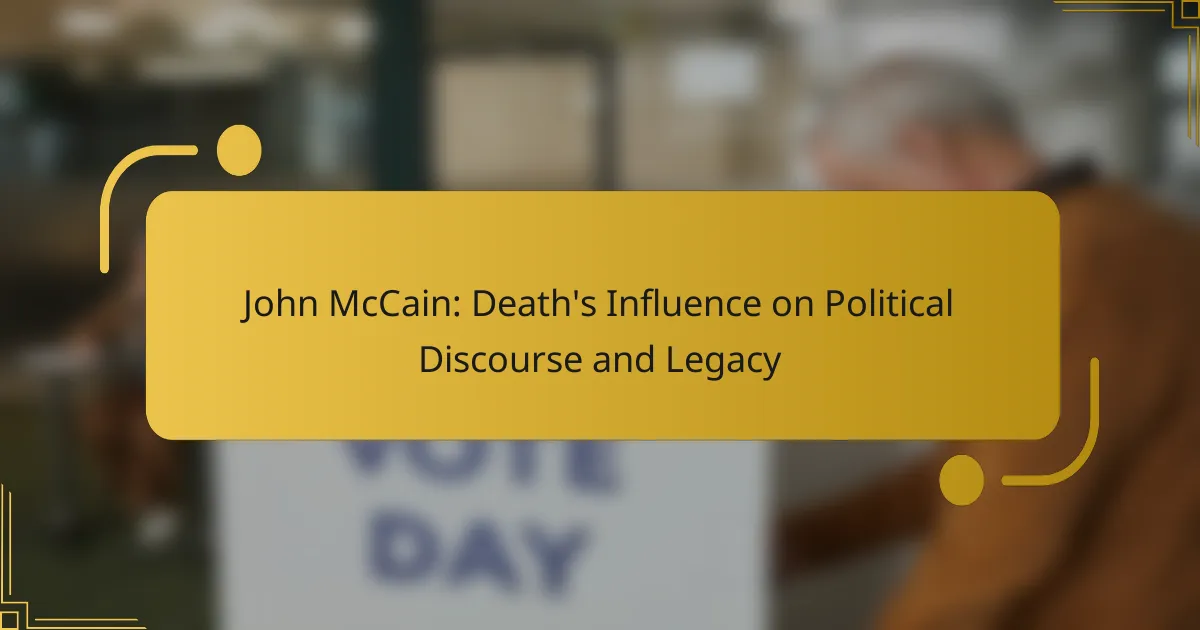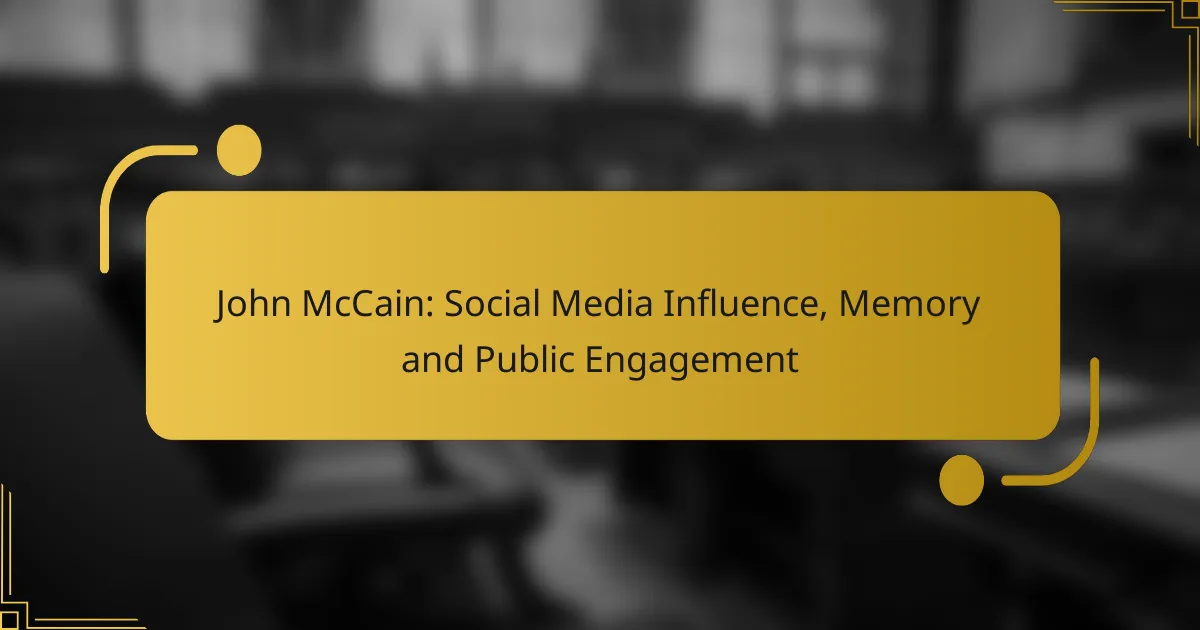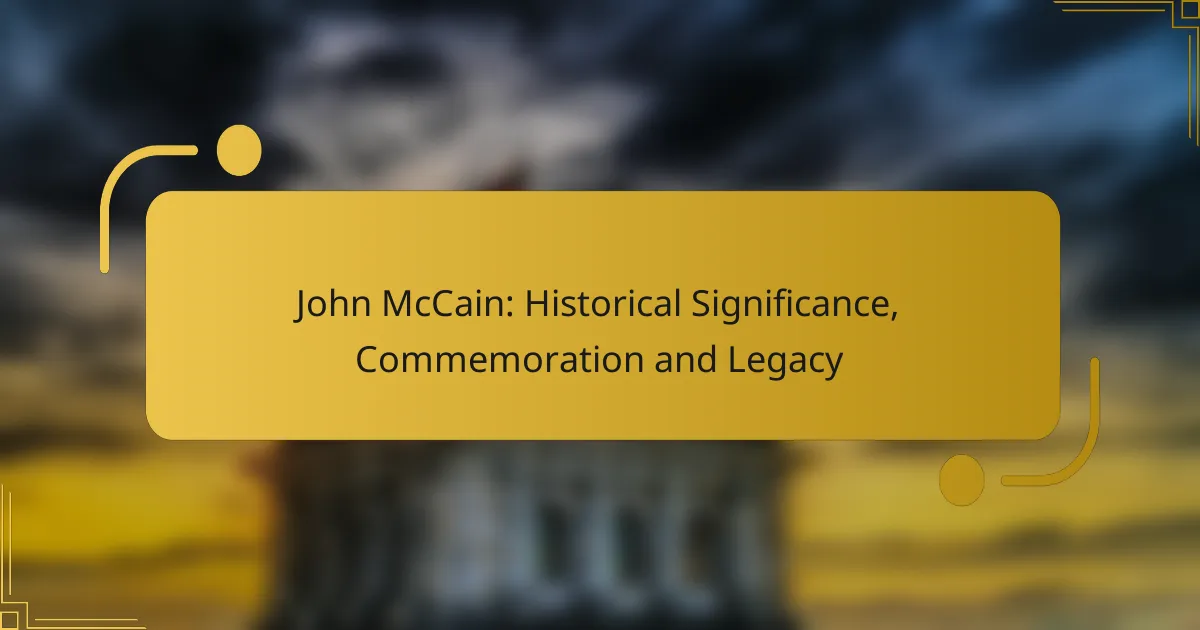John McCain’s death in 2018 sparked vital conversations about bipartisanship and civility in American politics, highlighting the values he upheld throughout his career. His legacy, marked by a steadfast commitment to national service and advocacy for veterans, continues to inspire current political leaders to prioritize collaboration over partisanship.

How did John McCain’s death impact political discourse in the United States?
John McCain’s death in 2018 significantly influenced political discourse in the United States by prompting discussions around bipartisanship, civility, and the values he championed throughout his career. His passing served as a catalyst for reflection on the current state of politics and the importance of collaboration across party lines.
Increased bipartisanship discussions
Following McCain’s death, there was a noticeable uptick in conversations about bipartisanship among lawmakers and the public. Many politicians referenced McCain’s legacy as a model for cooperation, emphasizing the need to work together on pressing issues like healthcare and national security.
This shift is evident in various legislative efforts, where some members of Congress have sought to bridge divides on contentious topics, inspired by McCain’s approach to politics. The dialogue around bipartisanship has become a focal point in many political forums and discussions.
Shift in public sentiment towards political civility
McCain’s passing prompted a renewed emphasis on political civility, with many citizens and leaders calling for a more respectful discourse. Public sentiment shifted towards valuing constructive dialogue over divisive rhetoric, reflecting McCain’s belief in the importance of mutual respect among political opponents.
As a result, numerous organizations and advocacy groups have emerged, promoting civility in political discussions. This cultural change encourages citizens to engage in conversations that prioritize understanding and compromise rather than hostility.
Revival of McCain’s core values in debates
In the wake of McCain’s death, his core values—such as integrity, service, and patriotism—have been revived in political debates. Many politicians and commentators have invoked his principles to argue for a return to ethical standards in governance and public service.
This revival is reflected in campaign platforms and public speeches, where candidates emphasize the need for leaders who prioritize the nation’s well-being over partisan interests. McCain’s legacy continues to inspire a generation of politicians to uphold these values in their work.

What are the key aspects of John McCain’s political legacy?
John McCain’s political legacy is defined by his unwavering commitment to national service, advocacy for veterans’ rights, and promotion of democratic values worldwide. These aspects reflect his dedication to his country and his belief in the importance of civic responsibility.
Commitment to national service
John McCain’s commitment to national service is exemplified by his military career and his time as a prisoner of war. He believed that serving one’s country is a fundamental duty and encouraged others to engage in public service as a means to strengthen democracy.
His advocacy for national service included support for programs like AmeriCorps, which provides opportunities for young people to contribute to their communities. McCain often emphasized that service fosters a sense of responsibility and unity among citizens.
Advocacy for veterans’ rights
McCain was a staunch advocate for veterans’ rights, working tirelessly to improve healthcare and benefits for those who served in the military. He pushed for reforms in the Department of Veterans Affairs to ensure that veterans received timely and adequate care.
His efforts included supporting legislation that aimed to address issues such as mental health services and access to education for veterans. McCain’s personal experiences as a veteran informed his advocacy, making it a central part of his political identity.
Promotion of democratic values globally
John McCain was a vocal proponent of promoting democratic values around the world, believing that democracy is essential for global stability. He supported foreign policies that encouraged democratic governance and human rights, particularly in regions facing authoritarian regimes.
His work included advocating for international assistance to support democratic movements and holding governments accountable for human rights abuses. McCain’s belief in the importance of democracy extended beyond borders, influencing U.S. foreign policy and international relations during his tenure.

How has McCain’s legacy influenced current political leaders?
John McCain’s legacy has significantly shaped the approach of current political leaders by promoting a culture of civility and bipartisanship. His commitment to principled leadership encourages politicians to prioritize country over party, influencing both Republican and Democratic strategies.
Inspiration for moderate Republicans
McCain serves as a role model for moderate Republicans who seek to balance party loyalty with independent thought. His willingness to cross party lines on issues like immigration reform and campaign finance has inspired others to advocate for similar approaches, emphasizing the importance of compromise in governance.
Many moderate Republicans today reference McCain’s legacy when addressing contentious issues, aiming to foster dialogue rather than division. This influence is evident in the rise of leaders who prioritize pragmatic solutions over strict ideological adherence.
Impact on Democratic strategies
Democrats have adjusted their strategies in response to McCain’s legacy, recognizing the value of appealing to moderate voters. His bipartisan efforts have prompted Democratic leaders to seek common ground on key issues, such as healthcare and national security, to attract centrist support.
Moreover, McCain’s approach has encouraged Democrats to engage in more constructive debates, focusing on policy solutions rather than personal attacks. This shift aims to create a more inclusive political environment that resonates with a broader electorate.
Encouragement for bipartisan initiatives
McCain’s legacy continues to encourage bipartisan initiatives in Congress, as many lawmakers strive to honor his commitment to collaboration. His ability to work across the aisle on significant legislation, such as the Affordable Care Act and immigration reform, serves as a blueprint for current and future lawmakers.
Efforts to revive bipartisan cooperation often reference McCain’s approach, highlighting the potential for successful governance when parties unite for the common good. This legacy is crucial in addressing pressing national issues that require collective action, such as infrastructure and climate change.

What lessons can be learned from McCain’s approach to political discourse?
John McCain’s approach to political discourse emphasizes the importance of compromise, integrity, and respectful dialogue. These elements are crucial for fostering a healthier political environment and encouraging constructive conversations among differing viewpoints.
Importance of compromise
Compromise is essential in politics as it allows for collaboration and progress. McCain often sought bipartisan solutions, demonstrating that working across party lines can lead to effective governance. For example, his role in the Gang of Eight immigration reform effort highlighted how compromise can address complex issues.
To practice compromise, focus on finding common ground rather than winning arguments. This may involve making concessions or adjusting your stance to accommodate others’ perspectives, which can ultimately lead to more sustainable outcomes.
Value of integrity in politics
Integrity in politics builds trust and credibility, both essential for effective leadership. McCain was known for his honesty and willingness to stand by his principles, even when they were unpopular. This commitment to integrity earned him respect from both supporters and opponents.
To cultivate integrity, always prioritize transparency and accountability in your actions. Avoid misleading statements and be willing to admit mistakes, as this fosters a culture of trust and respect in political discourse.
Need for respectful dialogue
Respectful dialogue is vital for constructive political discussions. McCain advocated for civility, believing that disagreements should not devolve into personal attacks. This approach encourages a more open exchange of ideas and reduces hostility among differing viewpoints.
To engage in respectful dialogue, actively listen to others and acknowledge their perspectives. Use language that is considerate and avoid inflammatory remarks, as this will promote a more productive and inclusive conversation.

How do McCain’s values resonate in today’s political climate?
John McCain’s values continue to resonate in today’s political climate by emphasizing bipartisanship, integrity, and service to the country. His commitment to these principles serves as a benchmark for current and aspiring politicians navigating a polarized environment.
Continued relevance of his principles
McCain’s principles, such as respect for opponents and prioritizing national interests over party loyalty, remain crucial in contemporary politics. Many leaders advocate for collaboration across party lines, reflecting McCain’s belief that effective governance requires compromise and dialogue.
Moreover, his dedication to human rights and global democracy influences discussions on foreign policy. Leaders often reference McCain when addressing international conflicts, underscoring the importance of moral clarity in decision-making.
Influence on younger politicians
Younger politicians frequently cite McCain as a role model for their approach to leadership. His willingness to challenge his party’s stance on critical issues encourages a new generation to prioritize ethical considerations over political expediency.
Programs and initiatives aimed at fostering civic engagement often highlight McCain’s legacy, inspiring young leaders to embrace public service and advocate for the values he championed. This influence is evident in the increasing number of bipartisan efforts led by emerging politicians.
Challenges to his ideals in current events
Despite the enduring appeal of McCain’s ideals, significant challenges persist in today’s political landscape. The rise of extreme partisanship often undermines the collaborative spirit he championed, making it difficult for politicians to engage across the aisle.
Current events, such as divisive electoral campaigns and social media polarization, pose obstacles to the implementation of McCain’s values. Politicians face pressure to conform to party lines, which can stifle the kind of independent thinking and integrity that McCain exemplified.

What are the emerging trends in political discourse influenced by McCain’s legacy?
John McCain’s legacy has sparked a renewed focus on civility and bipartisanship in political discourse. His approach to politics emphasized respect and collaboration, which has influenced various movements aimed at fostering a more constructive political environment.
Rise of civility movements
The rise of civility movements reflects a growing desire among citizens and politicians to engage in respectful dialogue. These movements advocate for a return to decorum in political discussions, encouraging individuals to listen actively and respond thoughtfully, rather than resorting to personal attacks or inflammatory rhetoric.
Organizations such as the National Institute for Civil Discourse and the Better Angels initiative promote workshops and events designed to bridge political divides. They emphasize the importance of understanding opposing viewpoints and finding common ground, which echoes McCain’s belief in the value of respectful disagreement.
Practical steps for engaging in civil discourse include using “I” statements to express personal feelings, avoiding generalizations about groups, and focusing on issues rather than personalities. By adopting these practices, individuals can contribute to a more constructive political atmosphere.



